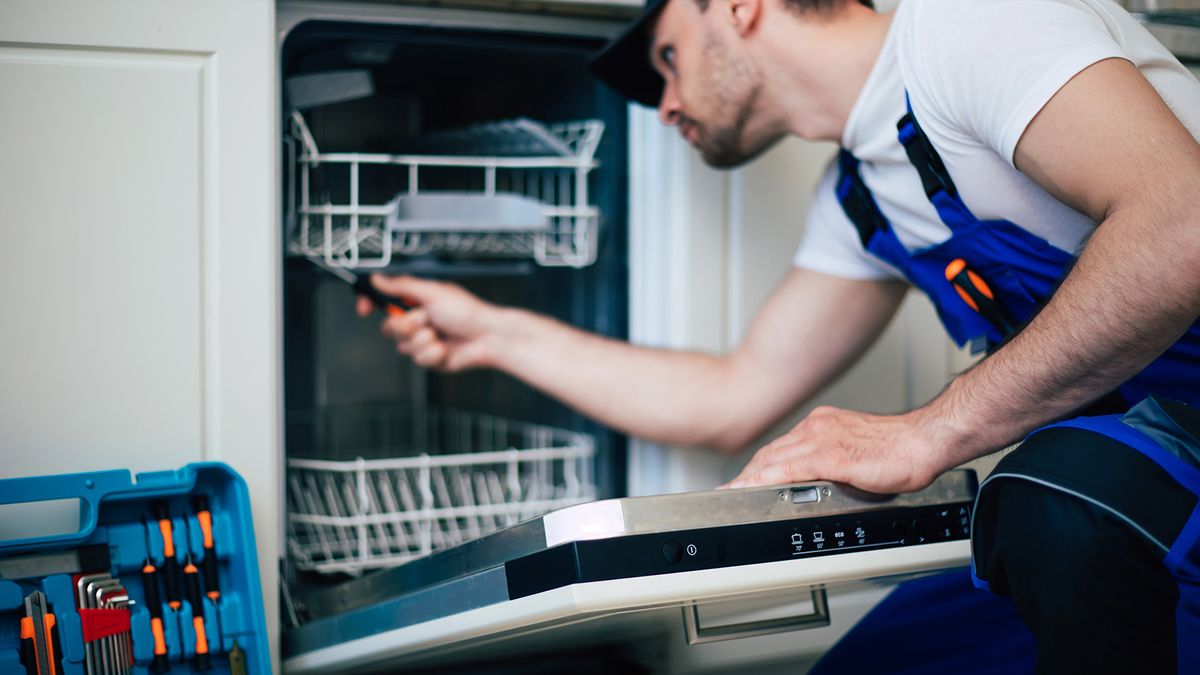Is your dishwasher making a grinding noise? Most dishwasher manufacturers stress how quiet their machines are during a cycle, whether filling, washing, draining, or drying. And there are quiet models among the best dishwashers to consider because, after all, who wants loud noises in their kitchen or utility room? Generally, the more expensive the model, the quieter it will be due to better-made parts and superior insulation – but that can change over time as the machine wears.
If a new, unusual noise comes from your dishwasher, it’s a sign of a problem. While all domestic appliances seem to make some sort of whining, buzzing, or whistling sound, grinding noise from your dishwasher is a problem you will want to fix.
Of course, your dishwasher has ‘normal’ sounds. They are:
1. The pump removes water left in the machine from last time.
2. The water inlet solenoid opens a valve to allow water into the machine.
3. The circulation pump motor forces water through the rotating arm.
4. The drain pump removes the water.
However, hearing unusual sounds during these phases means you have a problem with a moving part. The critical thing now is to find out which.
Chris A. Zeisler is the lead technical expert at RepairClinic.com. He says, “The number one cause for your dishwasher making a grinding noise is your drain pump. First, check the drain pump to ensure that it is clear of debris. If the drain pump is clean but still noisy, you need to replace it."
Your dishwasher will usually make a sound if there is a broken part if something is loose if bearings are damaged, or if the impeller arm has become dislodged. Working through the machine’s cycle, you may notice the sound at one time, which can help you identify the culprit.
The main moving parts, which can make a noise when defective, are:
Inlet valve: This allows water in
Circulation pump: This spins the propeller arm
Drain pump: This drains and pumps water
Impeller: This is the rotating arm
Drain valve solenoid: This works the drain pump
Chris A. Zeisler is the lead technical expert at RepairClinic.com, a leading outlet for spare parts for electrical appliances. They stock over four million parts and can offer help with everything from lawn equipment to heating systems and household appliances.
Chris says that a common cause of a noisy dishwasher "is the circulation pump. This has bearings that wear out over time. When the motor bearings fail, they generate a continuous drone. In this case, you must replace the entire circulation pump.

“The other major culprit is your water inlet valve, which opens to allow water to enter the dishwasher. When new, it is very quiet during operation. Over time, the diaphragm inside the valve deteriorates and deforms. This deformation interacts with the water rushing in and can produce a loud vibration, buzzing, squealing, or other noises. If the dishwasher is loud during the filling cycle, replacing the water inlet valve may solve the problem.”
Fixing a dishwasher making a grinding noise
It’s possible that there is a simple solution, and your first action should be to open, empty, and clean your machine. You might have a pip or kernel stuck somewhere, or a piece of flatware may have jammed the rotating arm. Alternatively, perhaps the machine may be badly loaded so that items rattle against each other while the machine is in motion, or the water inlet pipe may knock against neighboring cabinets.
To rule these out, open and empty the machine, remove the trays, and search every nook to see if something is stuck (turn off the power first). Look at easy-to-miss places like the drain, and if you think the machine is banging against the side, check that it's level – adjust the feet if not.
Once you’ve narrowed down which piece of the machine is defective, you can start to fix it. If you are a keen DIY-er, take a look at the defective part and note any make and model numbers. You can usually find a store or online vendor that will have the correct part so that you can replace it. Remember to disconnect the machine from the power before attempting any repair, make sure you have the right tools, and take it slowly. The last thing you want is to find that you flood the floor after all your hard work!

